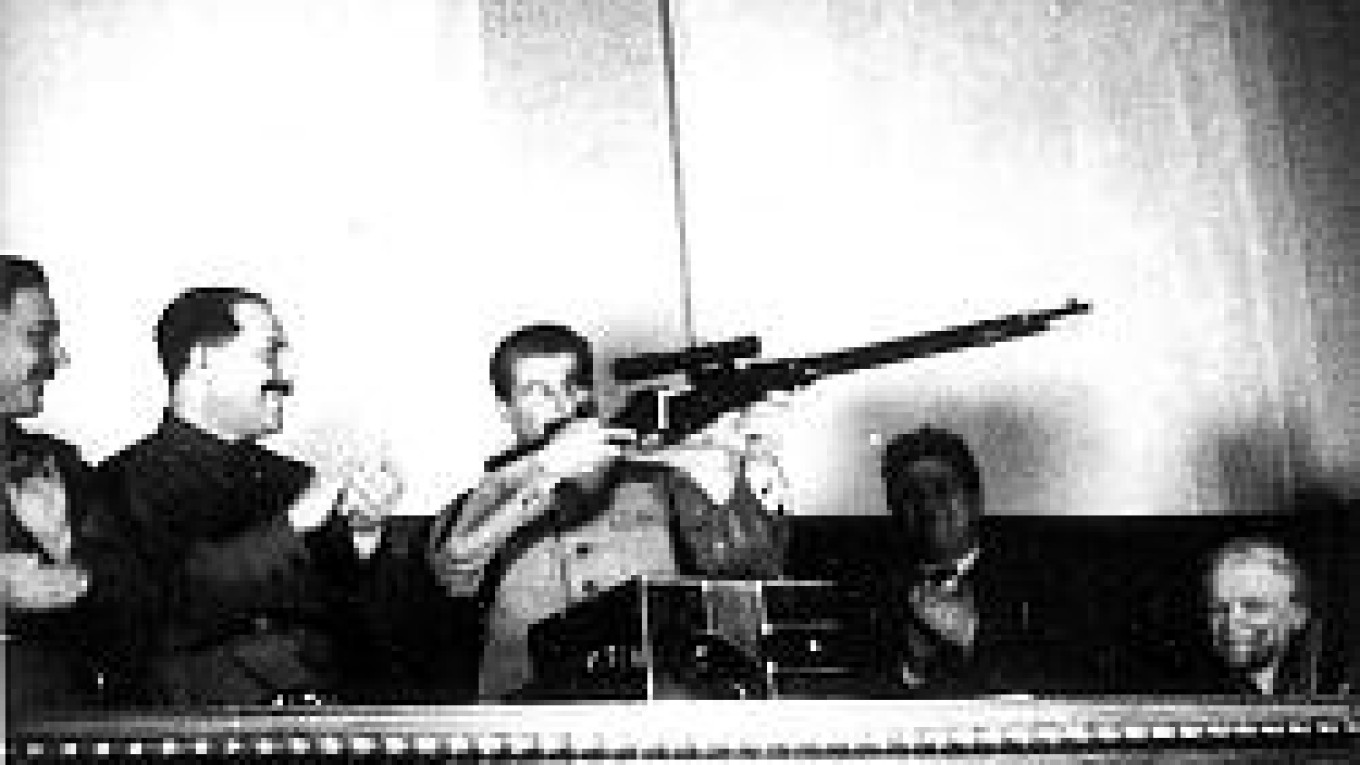In 1934, the moment might still have seemed funny. But by the end of Stalin's reign, almost half of those who witnessed his morbid sense of humor that day would be shot.
Stalin's joke, which is captured on grainy black-and-white newsreel, is just one of the chilling images now on display at the first-ever archival exhibit about the 17th Party Congress -- an event labeled the "Congress of Victors" at the time, but later redubbed the "Congress of the Shot."
Organized by the Federal Archive Agency with the participation of such diverse groups as the Federal Security Service and the human rights watchdog Memorial, the exhibition features a wealth of documents, photographs, films and paintings, as well as the rifle that Stalin pointed at his comrades.
Besides the party congress itself, the exhibit also covers its aftermath. Documents pertaining to purges of the late '30s are also on display, as well as an original draft of Nikita Khrushchev's secret speech from 1956 denouncing Stalin's "cult of personality."
The end result of the 17th Congress, said Nikita Petrov, a researcher at Memorial, was to solidify Stalin's position as the unchallenged party leader -- and to lay the groundwork for the Great Terror.
"This party congress had the result of giving all power to Stalin," Petrov said. "There was no discussion here, not a word against Stalin. It was the way congresses would go until perestroika."
While items presented here have already been available to historians ready to comb through the archives, they have never before been brought together in a public showing, organizers said.
Alexei Litvin, the exhibit's curator, calls the display a "weather balloon" of society's attitudes in the mid-1930s. "There had been big changes -- revolution, war, the beginning of industrialization," he said. "However, in 1934, there was the sense that the most difficult parts were over."
Of course, for many -- including the majority of the congress's attendees -- the most difficult times were yet to come. Of the 1,966 attendees, 1,103 would be arrested and 848 shot. Of the 139 delegates elected to the Central Committee at the 17th Congress, 101 were shot and five committed suicide.
Organizers say that the exhibit also corrects certain myths that have obscured the origins of the purges. One of those myths surrounds the vote for party leadership. During the congress, delegates were asked to vote by secret ballot, taking a list of party leaders' names and crossing off those they did not want.
According to lore, hundreds of delegates at the 17th Congress favored Sergei Kirov, the Leningrad party boss, as a moderate alternative to Stalin. Legend further has it that as many as 300 dared to vote against Stalin, but their ballots were thrown out.
Not so, according to Litvin.
While 166 ballots indeed remain unaccounted for, there is no evidence that all 1,255 delegates eligible to vote actually did so. Some, Litvin said, may simply have missed the vote.
Instead, the available material from the archives shows a surprising willingness to let Stalin grab power, according to Litvin, and little attempt to stop him. Petrov asserted that only three ballots, in fact, were cast against Stalin.
"Even if 166 people had voted against him," Litvin said, "we still have the vast majority refusing to take responsibility for their own future."
"17th Congress of the All-Union Communist Party of Bolsheviks" runs to June 1 at the Exhibition Center of the Federal Archives, located at 17 Bolshaya Pirogovskaya Ulitsa, Bldg. 1. Metro Frunzenskaya. Tel. 245-8125.
A Message from The Moscow Times:
Dear readers,
We are facing unprecedented challenges. Russia's Prosecutor General's Office has designated The Moscow Times as an "undesirable" organization, criminalizing our work and putting our staff at risk of prosecution. This follows our earlier unjust labeling as a "foreign agent."
These actions are direct attempts to silence independent journalism in Russia. The authorities claim our work "discredits the decisions of the Russian leadership." We see things differently: we strive to provide accurate, unbiased reporting on Russia.
We, the journalists of The Moscow Times, refuse to be silenced. But to continue our work, we need your help.
Your support, no matter how small, makes a world of difference. If you can, please support us monthly starting from just $2. It's quick to set up, and every contribution makes a significant impact.
By supporting The Moscow Times, you're defending open, independent journalism in the face of repression. Thank you for standing with us.
Remind me later.


